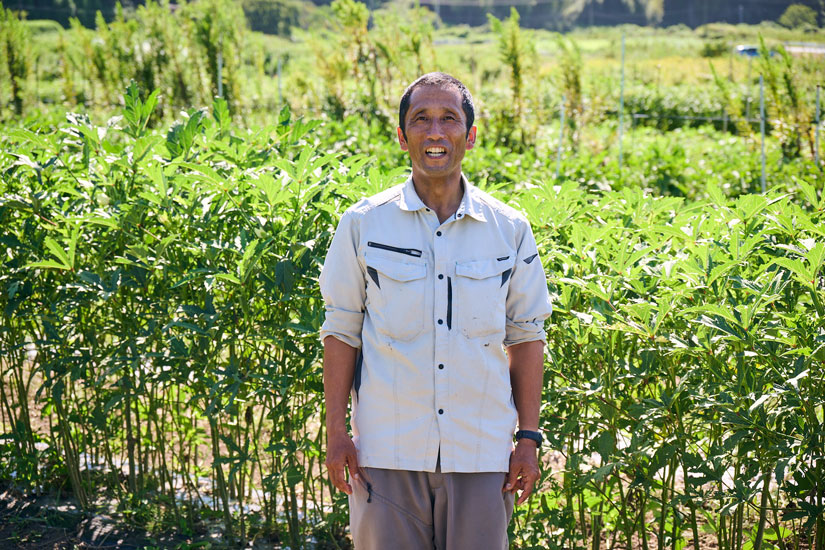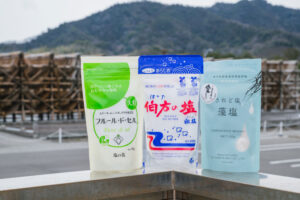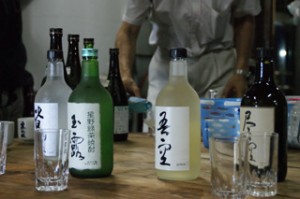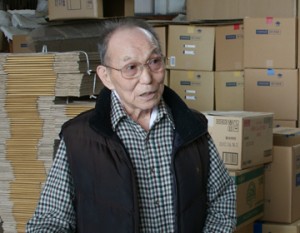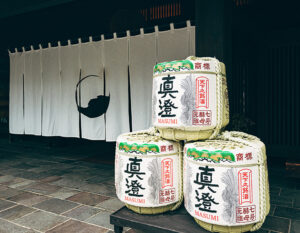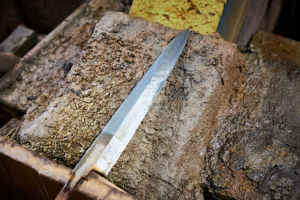While the movement to grow organic vegetables is spreading throughout Japan, Takanori Okamoto of “Okomo Farm” uses a simple style of farming, putting nothing but green manure in his fields. He and his wife and children grow vegetables naturally, using no pesticides or fertilizers, in a 9-tan (about 2700 tsubo) field in the mountains of Tateyama City, Chiba Prefecture, an area blessed with nature. Okamoto-san says his mission is to “deliver vegetables that are safe and secure, kind to the hearts and bodies of people and animals, and nurtured by the power of the earth.”
Pioneer place for organic vegetables in Japan
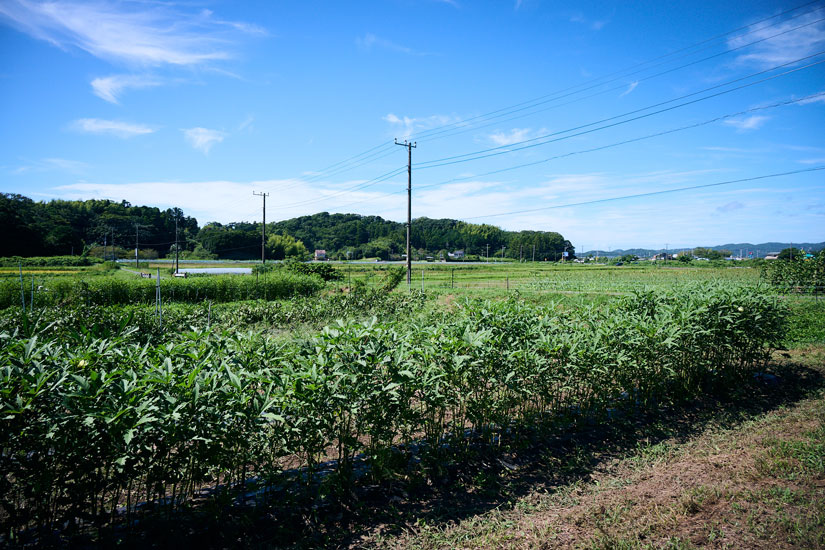
Tateyama City, located at the southern tip of Chiba Prefecture, has a long coastline, surfing, scuba diving, and other oceanic activities that conjure up images of the sea, but it is also a thriving livestock producer and grower of flowers, vegetables, and fruit trees.
The city has one of the longest hours of sunshine in the Kanto region, a mild year-round climate, mineral-rich sea breezes, and fields on well-drained land, making it possible to cultivate crops and double cropping throughout the year.
Organic farming began in the Miyoshi region of Minami-Boso about half a century ago. A group of consumers in the Tokyo metropolitan area who were concerned about food and farmers in the area who wanted to produce safe food with their own hands joined forces to engage in organic farming, which was said to be impossible at the time, and have continued to produce safe and secure agricultural products.
The farmers are able to stabilize their income by buying back what they produce. Organic farming has flourished through decades of continuity, and the number of newcomers who have heard about it and want to become farmers is increasing in this area. It is, so to speak, a pioneer place of organic farming in Japan.
Started with no experience in agriculture. 17 years later, where he is today.
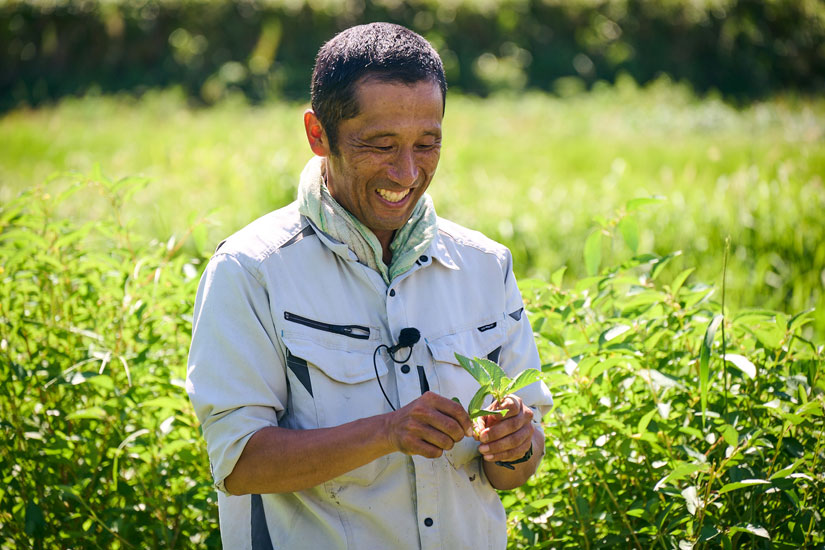
Okamoto Takanori, the representative of “Okomo Farm,” started farming before he turned 30 years old. His family was not a farmer, and he had no experience or knowledge of farming. All he had was a strong determination.
Okamoto-san was born and raised in Tateyama. He graduated from a vocational school in Tokyo and worked for the Ministry of Agriculture, Forestry, and Fisheries (MAFF) for 10 years. When it came time to pursue a career in agriculture, he entered the “Tosa Shizen Juku,” a school run jointly by Kochi Prefecture and a local NPO to train the next generation of farmers in organic farming techniques and management. He then searched for land in his hometown of Tateyama, where he found his ideal piece of land through a person-to-person relationship and took on the challenge of using “pesticide-free and fertilizer-free” methods. He has been growing vegetables completely by the power of the soil for 17 years now. He said “Compared to my stable days as a civil servant, my income is much lower, but I am very satisfied because I am able to do what I like while dealing with nature every day.”
Utilize soil health with no pesticides or fertilizers.
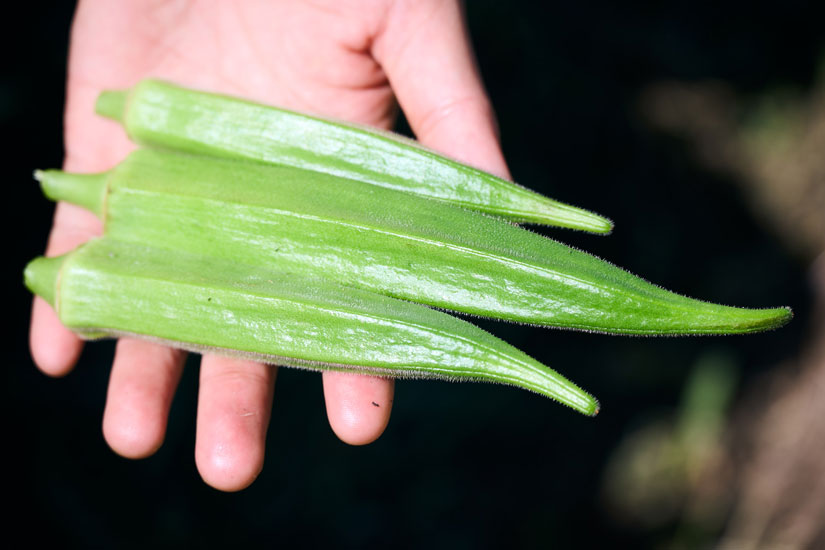
Okamoto-san, who is a vegetable lover by nature, decided to “try something that other people are not doing” and started growing vegetables similar to natural farming in his first year of farming. Since he uses no pesticides and no chemical fertilizers, the environmental impact on soil and water quality is minimal, and since he does not use organic fertilizers, he does not have to pay for them. The biggest advantage is that they can enjoy the true taste of the vegetables, but in the beginning it took time to obtain a certain yield. Through trial and error, he got to this point by trusting in the power of the soil. It imagined that it was a tough challenge, but he responds with a soft smile.
“I was desperate to do the daily farm work, but I enjoyed what I was doing so much that I didn’t feel any hardship.”
The idea is that what is picked in the field is returned to the field.
As relying on the power of the soil, the company uses green manure, which uses the plants themselves as fertilizer. Leguminous plants are planted here and there in the field to bring out the action of rhizobium bacteria.
These rhizobium bacteria are soil microorganisms that produce large numbers of small nodules, called rhizobium, on the roots of leguminous plants, which convert nitrogen in the air into ammonia and amino acids that can be used by plants. While acting like a natural fertilizer factory, rhizobia also receive energy sugars from plant roots, which has a positive effect on vegetable cultivation even in soils with low nitrogen content.
In addition, Okamoto-san crushes crops that are past their harvest time into small pieces and returns them to the field soil. Weed management is an issue, he says, but he also breaks the weeds into small pieces and returns them to the field soil. “What is produced in the field is returned to the soil. The repetition of this process has improved our crops,” says Okamoto-san. Even within a single field, there are different areas with good or poor sunlight, good or poor drainage, and the placement of green manure, but in Okamoto’s words, he is “designing the field.”
Mutual face-to-face relationship between producers and consumers
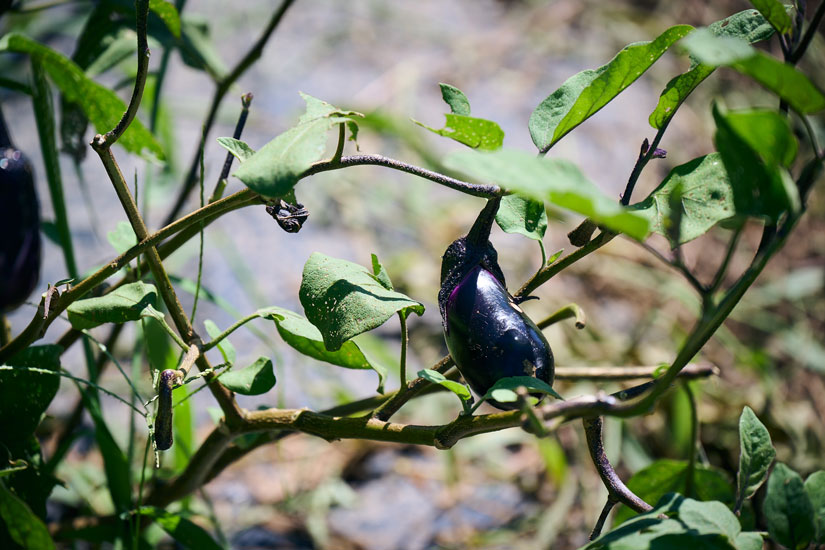
No pesticides and no fertilizers are the best way to take advantage of nature’s power, but only rainwater is used for water. The land is moderately moist, and when it rains, the water drains off well. The soil is neither clayey nor dry, and even when there is no rain for a month, the crops do not wither. The soil is in remarkably good condition.
Through trial and error, Okamoto-san has noticed which vegetables do and do not suit this soil, and now produces about 50 varieties of vegetables, including eggplant, bell peppers, okra, water spinach, molokheiya, bitter gourd, potatoes, and garlic. Producing multiple varieties of vegetables is an effective way to hedge against the risk of continuous crop failure that can occur when growing the same variety of vegetables.
The vegetables harvested at “Okamo Farm” have a strong, natural flavor and sweetness. Okamoto-san says, “I think the vegetables’ original flavor comes out because we don’t use fertilizers, and even with the same farming method, the flavor varies depending on the grower and soil. I think the flavor of Okomo Farm comes out,” he said with a smile. He also says that the vegetables themselves are getting better every year.
On the other hand, it was not easy to develop new customers. At first, they sold their product at farmer’s market with a label that included “Okomo Farm’s” contact information. They also actively participated in local events, distributing flyers and networking to gradually develop their customer base.
The seasonal vegetables from “Okomo Farm” spread by word of mouth, and now they sell “omakase sets” containing several kinds of seasonal vegetables, which have been well received. Okamoto-san now has about 40 customers, and he personally takes the wheel to deliver fresh vegetables to customers in the Tokyo metropolitan area for home delivery.
Incidentally, there is only one rule for purchasing Okamoto-san’s vegetables. That is to visit the Okamo Farm’s fields and get to know the vegetables as they are grown.
“I want them to actually visit the farm and get to know the condition of the farm and my personality. I want them to get to know each other, face to face.”
local production for local consumption
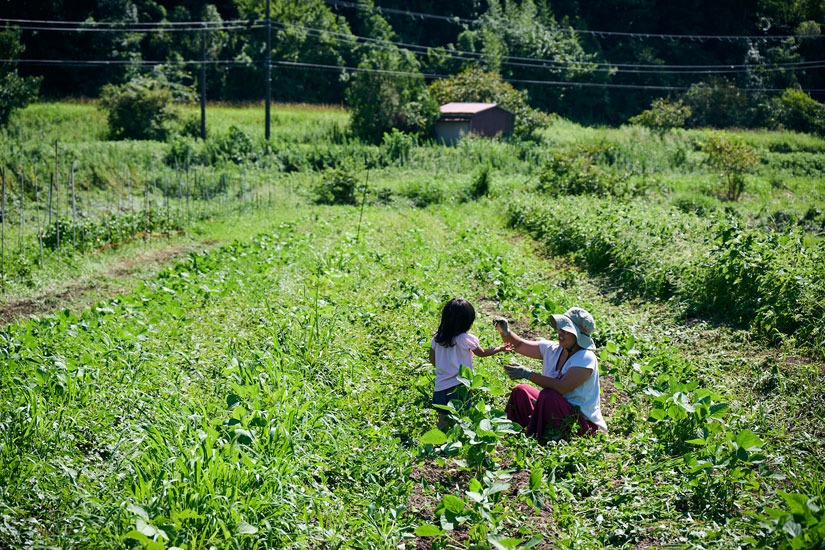
If he wanted to expand his sales channels, he could target the Tokyo metropolitan area, but Okamoto-san’s wish is that “as much as possible, I want local people to eat locally produced food, because I believe it is the best for their health.”
Local production for local consumption. This has the advantage of enabling people to enjoy fresh, seasonal ingredients that are unique to the area, revitalizing local agriculture, and improving food self-sufficiency. Locally produced food is consumed within the region, leading to local economic circulation.
Chiba Prefecture is promoting local production for local consumption as a prefecture-wide initiative under the name of “千産千消-Chisanchisyou-,” with the basic goal of “creating healthy and spiritually rich people throughout their lives by practicing a well-balanced diet incorporating the bounties of Chiba. Every November, a “千産千消” day is set aside.
Okamoto-san also donates fresh potatoes to a nearby nursery school. By having them served during school lunch time, he also works to promote interest in locally grown food
The soil, vegetables, and people are connected.
“Minami-Boso Organic” was established after individual producers gathered at a seminar held by the Awa Agricultural Office in 2012 to exchange information, hold study sessions, and deepen their friendship. Led by Okamoto-san, who served as the group’s first chairman, the group consists of six young farmers who are committed to growing vegetables, rice, and fruits in the region without the use of synthetic pesticides or chemical fertilizers.
Currently, “Minami-Boso Organic” holds “Sunday Marche” on the first Sunday of every month at Tateyama Pioneer Farm in Tateyama City. The event is a place to interact with local consumers while valuing face-to-face relationships, such as direct sales of farm products, processed products, and consultations on farming, and has been well received.
The farm also recruits trainees who would like to become independent farmers in the future, and while visiting each farm, they see, hear, and learn about the farm’s unique management style and organic farming, and make friends who can work together to promote organic farming in the region.
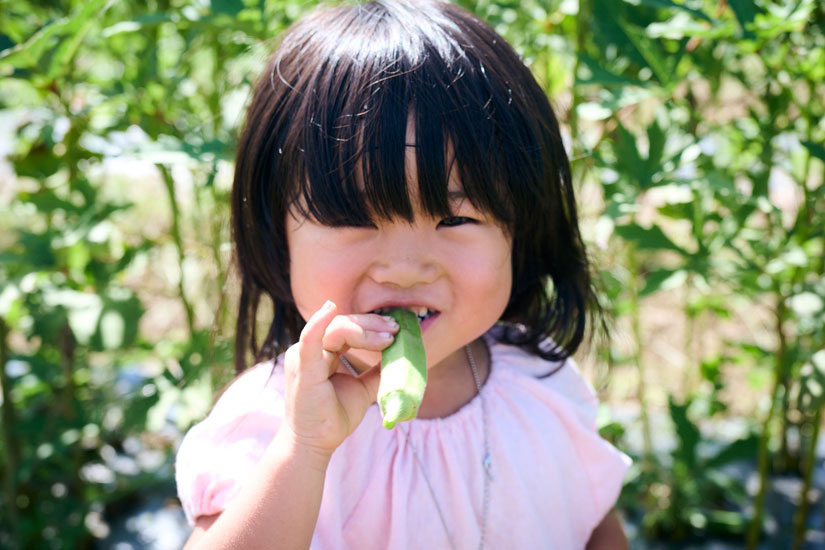
To bring smiles to the faces of those who eat it and make them happy. That is his goal for the future.
“I want to be a person who can give. I want the people around me to be happy by giving, and it will come back to me someday. I think it will also lead to the growth of my own farm.”
While supporting farmers to start farming, the soil and vegetable production connects people to each other. The circle of local production for local consumption through organic farming is expanding from here at “Okomo Farm.”



